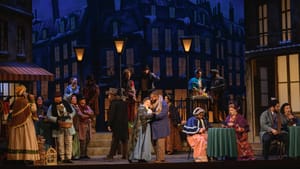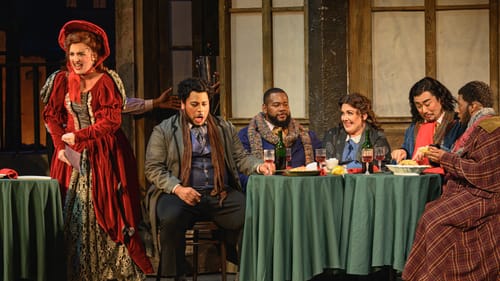Stay in the Loop
BSR publishes on a weekly schedule, with an email newsletter every Wednesday and Thursday morning. There’s no paywall, and subscribing is always free.
Puccini’s genius lives on
OperaDelaware and Opera Baltimore present Puccini’s La bohème

To open its 80th season, this fine regional company presented a lively, beautifully staged production of the (deservedly) popular La bohème. Written by Giacomo Puccini and first performed in 1896, this opera is the canon’s most familiar and most produced work.
Set in 1830s Paris and based on Scènes de la vie de bohème, a popular novel by Henri Murger, the opera opens in winter in the garret shared by four impoverished bohemians. Poet Rodolfo (tenor Edward Graves) and painter Marcello (baritone Daniel Rich) are so cold that they burn some of Rodolfo’s unpublished works to warm up when they are joined by their roommates, philosopher Colline (bass Christian Simmons) and musician Schaunard (baritone Gerard Moon).
It's Christmas Eve, and after tricking their landlord out of the overdue rent, the group decides to celebrate at Café Momus, their favorite haunt. Rodolfo remains behind to finish some work when his life is changed by a knock at the door. His neighbor Mimí (soprano Toni Marie Palmertree) asks him to light her extinguished candle. What’s ignited instead is their love, and they head to the café to join the group.
The opera’s second act is a justly famous, gorgeously written crowd scene, the streets of Paris crowded with holiday-goers, vendors, and children. At the café, the friends see Musetta (soprano Emily Margevich), Marcello’s former lover, who taunts him on the arm of her new and wealthy patron. She soon returns to Marcello’s side, however, and the friends leave in high spirits.
Act III opens at a tollgate on the outskirts of Paris, where (amid a snowstorm) Mimí comes to a tavern where the constantly quarreling Musetta and Marcello have taken up residence. She is ill and seeking Rodolfo, whose fear of losing her she misconstrues as jealousy. The lovers agree to stay together and then separate in the spring. But in Act IV, back in Rodolfo’s garret, Mimí’s condition worsens, and her friends gather around her as she dies.
Radiance and elegy
As Mimí, Palmertree is radiant in young love and heartbreaking as she weakens. Her singing and characterization are radiant, especially as she describes her life in the Act I aria Sì, mi chiamano Mimí (“I am called Mimí”). The soprano details each of the things in Mimí’s small world—her embroidery, the flowers that she makes, the sun coming through her window—with great affection and grace, making this character very moving and instantly comprehensible.
Likewise, Margevich as Musetta sets out her impetuous nature with a winning rendition of her second-act entrance aria, Quando m’en vo (Musetta’s Waltz), telling all who will listen (and everyone listens) of her magnetism and sex appeal. But the singer makes a convincing character reversal at the opera’s end, revealing Musetta’s generous heart and her love for them all.
La bohème is filled with memorable character-defining arias, including Rodolfo’s famous Act I love song to Mimí, Che gelida manina (“How cold are your hands”). Throughout, the opera’s four bohemian roommates are sung with energy and appealing camaraderie that turns slowly to introspection as the opera’s plot darkens. In Act IV, Colline’s lament (Vecchia zimarra, affectingly sung by Simmons) for the tattered overcoat he sells to raise funds for Mimí’s care becomes Puccini’s elegiac dirge for the heedless bohemian life that is fast coming to an end for all of them.
Fully realized and beautifully evocative
Part of the strength of this opera lies both in its brilliant libretto and its beautiful music, which work strongly together to create true-to-life characterizations. These young Parisians are recognizable people—they support one another, argue, make up, are silly, are serious about their work, break apart, and come back together—as people have always done, as we do now.

In addition, Puccini was an undisputed master of orchestration, especially in this opera, which is full of seemingly small or inconsequential musical touches that fully define both setting and character. The offstage quiet perdendo (“getting lost”) vocals, harp glissandi, chiming of church bells, the marching band: these and countless more musical moments were all fully realized by an excellent orchestra under Domenico Boyagian’s sensitive baton.
The busy chorus (especially in Act II) sang with excellence, the work of chorus master George Hemcher and staging by Haley Stamats (especially the hijinks of the four roommates) was inventive and always interesting. Sadly, lighting by Tláloc López-Watermann was inconsistent (sometimes too dim, others too bright). But the production featured superlative scenic design by Robert Little. All three of his locales—the stark artists’ garret, the bustling Christmas-Eve café, and the wintry city gates in a snowfall—were fully realized and beautifully evocative.
A feast for opera lovers
This is OperaDelaware’s fourth artistic partnership with its neighbor to the south, Baltimore Opera, who also presented this production. And La bohème has been staged in scores of iterations, including a recent Opera Philadelphia adaptation that started at the tragic ending and worked backward to the story’s romantic onset. In other genres, the opera was a prominent feature in the film Moonstruck, and it was the inspiration for the Broadway musical Rent.
In my early 20s, I stumbled onto a rehearsal in a Washington, DC, venue where I was working. I had never seen an opera, and I had no libretto, no supertitles, no cast list. But I was riveted (like Cher in the film) and mesmerized; I slipped unobtrusively into every rehearsal and performance, feasting on its musical joy.
La bohème has done the same for countless audiences over its long lifetime, touching them deeply and bringing them to their feet, as it did at this performance. Though 1830s Paris might be two centuries ago and far away, in a strong production like this one, Puccini’s genius always brings us home.
What, When, Where
La bohème. Music by Giacomo Puccini, libretto by Luigi Illica and Giuseppe Giacosa; conducted by Domenico Boyagian, stage direction by Haley Stamats, and chorus mastery by George Hemcher. OperaDelaware and Opera Baltimore. October 25 and 27, 2024, at the Grand Opera House, 818 N Market Street, Wilmington. (302) 442-7807 or operade.org.
Accessibility
The Grand’s entrance is at street level, and the venue is equipped with elevators and wheelchair accessibility/seating.
Sign up for our newsletter
All of the week's new articles, all in one place. Sign up for the free weekly BSR newsletters, and don't miss a conversation.

 Gail Obenreder
Gail Obenreder